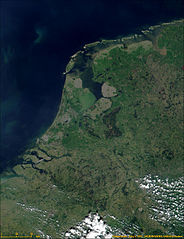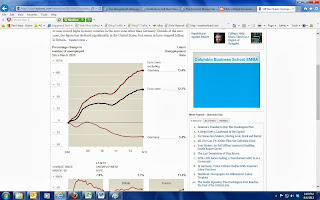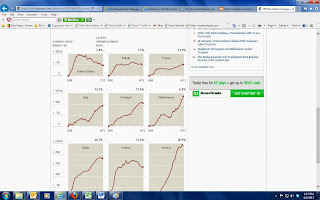After I just mentioned in a previous post, Europe and Euro Still in Hot Waters , that
more and more European pundits are becoming pessimistic about the Euro-zone, now several media report about the deteriorating situation in the Netherlands.
First, Floyd Norris reports in the New York Times, Jobs Recovery in Europe Is Also Painfully Slow, that:
"The number of unemployed workers in the euro zone fell in June, the
European Union’s statistical agency estimated this week. The decline was
not large — 24,000 jobs, or 0.1 percent of the 19.3
million people out of work in May. But it was the first month in more
than two years that there had been a decline."
But then the article continues:
" how little improvement there has been in most of the Euro zone countries shown.
Germany is the striking exception to that, of course, and the number of
unemployed in the United States has been falling steadily if slowly, since 2010. On Friday, the government reported that the
American unemployment rate fell to 7.4 percent in July, the lowest since
December 2008. The number of people out of work in Britain (i.e. not a Euro-zone member) fell in 2012
but has stabilized in recent months.....
Perhaps the most extraordinary development has been in the Netherlands,
where the number of unemployed workers has begun to rise rapidly after
rising relatively slowly early in the credit crisis. Nonetheless, the
latest unemployment rate for the Netherlands is only 6.8 percent, a
figure that is lower than that of either the United States or Britain
and about half the rate in Ireland."
Unemployment in the Euro-zone (New York Times)
Unemployment in individual EU countries (New York Times)
Also, the British magazine The Economist wrote a critical story about Euro-developments in the Netherlands, A founding member’s apostasy Fanned by Geert Wilders, Dutch Euroscepticism is on the rise. The Economist first describes the positive role the Dutch have played in Europe:
"The Cosmopolitan Netherlands once stood at the heart of the cause of European
integration. The country was among the founding members of the European
Union and of the Schengen open-border treaty. With its economy looking
to Germany, its cultural aspirations to France, and its political
liberalism to Britain, and with an educated class that spoke all three
of those countries’ languages as a matter of course, the Dutch saw
themselves as the ideal mediators in the European project."
Then it moves to the current situation:
"Those
days are gone.......Mr Geert Wilders’s party (i.e. a firebrand rightwing politician) has taken advantage of rising Dutch anger over the
euro crisis in the past two years by shifting the focus of its criticism
from Islam to the EU."
The article refers to a recent Gallup poll,
where European citizens were asked whether their country should leave
the European Union. All EU countries rejected this, with the exception
of the U.K. (!), where 55% said the UK should leave, and the Netherlands
which was evenly split: 39% in favor and 39% against leaving.
The Economist continues:
"Anti-European
feeling in the Netherlands is rooted in the
deteriorating economy. The country weathered the first years of the euro
crisis relatively unscathed, maintaining its AAA credit rating and a
4.5% unemployment rate, the lowest in Europe. With their privileged
economic position, the Dutch blamed profligate southern Europeans for
demanding support from the north. In 2011 they led the AAA countries
(along with Germany, Finland and Austria) that demanded Europe harden
its 3% budget-deficit limit as part of the price for that support.
.........Yet as deficit-cutting progressed across Europe, the Dutch
economy
turned south. It has now been in recession for six quarters, with output
1.8% lower in May compared with a year earlier and unemployment rising
to 6.8 %. Every economic projection has proved too optimistic."
No one can deny things have been brewing in Europe for quite a while now: from the heated situation in Greece and Portugal, to those of Spain, Italy, Ireland and France, now the economic deterioration is moving to the Netherlands. History is full of examples where a weakening economy has caused protests, unrest, and even civil wars and worse. As the American economist James Galbraith said in an interview posted earlier, " If I were in a position to counsel European authorities, which I do from the margins, I would say, you need to rethink your ideas quickly. Time is not on your side on this issue."
The question is whether politics in the Netherlands (and the rest of Europe for that matter) is convinced of the urgency needed to convince the people that better times are ahead, and that it is the Euro which will help to achieve those better times.

v2.jpg)
.jpg)
No comments:
Post a Comment